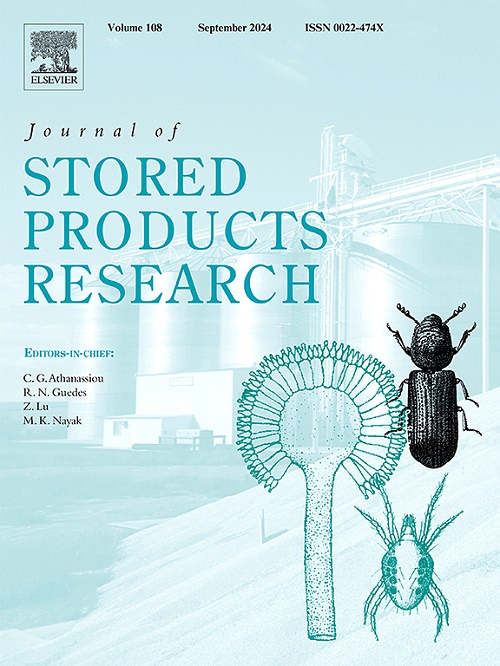Evaluation of α-glucosidases as potential targets for the control of corn weevil, Sitophilus zeamais (Coleoptera, Curculionidae)
IF 2.7
2区 农林科学
Q1 ENTOMOLOGY
引用次数: 0
Abstract
The maize weevil, Sitophilus zeamais, is one of the most relevant insect pests of stored corn grains. There are currently few alternatives for its control, most of which are synthetic pesticides. In this work, we explored the potential to control S. zeamais by targeting its α-glucosidases. By using different approaches, we successfully identified two non-redundant α-glucosidases. In silico analysis revealed that both proteins had conserved structural motifs related to α-glucosidases. Molecular dynamics simulation indicated that these enzymes are able to interact with the α-glucosidase inhibitor, acarbose. The acarbose-α-glucosidase complexes exhibited a high affinity between the inhibitor and the catalytic site. Feeding adult S. zeamais with acarbose-impregnated maize resulted in over 30 % mortality, suggesting that the application of α-glucosidase inhibitors could enhance the resistance of maize grains against S. zeamais.

α-葡萄糖苷酶作为玉米象鼻虫防治靶点的研究
玉米象甲(Sitophilus zeamais)是与贮藏玉米籽粒最相关的害虫之一。目前控制其的替代品很少,大多数是合成农药。在这项工作中,我们探索了通过靶向其α-葡萄糖苷酶来控制玉米玉米球菌的潜力。通过不同的方法,我们成功地鉴定了两个非冗余的α-葡萄糖苷酶。硅分析显示,这两种蛋白都具有与α-葡萄糖苷酶相关的保守结构基序。分子动力学模拟表明,这些酶能够与α-葡萄糖苷酶抑制剂阿卡波糖相互作用。阿卡波糖-α-葡萄糖苷酶配合物在抑制剂和催化位点之间表现出高亲和力。用玉米糖苷浸渍的玉米饲喂玉米玉米螟成虫,死亡率达30%以上,说明α-葡萄糖苷酶抑制剂可以增强玉米籽粒对玉米玉米螟的抗性。
本文章由计算机程序翻译,如有差异,请以英文原文为准。
求助全文
约1分钟内获得全文
求助全文
来源期刊
CiteScore
5.70
自引率
18.50%
发文量
112
审稿时长
45 days
期刊介绍:
The Journal of Stored Products Research provides an international medium for the publication of both reviews and original results from laboratory and field studies on the preservation and safety of stored products, notably food stocks, covering storage-related problems from the producer through the supply chain to the consumer. Stored products are characterised by having relatively low moisture content and include raw and semi-processed foods, animal feedstuffs, and a range of other durable items, including materials such as clothing or museum artefacts.

 求助内容:
求助内容: 应助结果提醒方式:
应助结果提醒方式:


